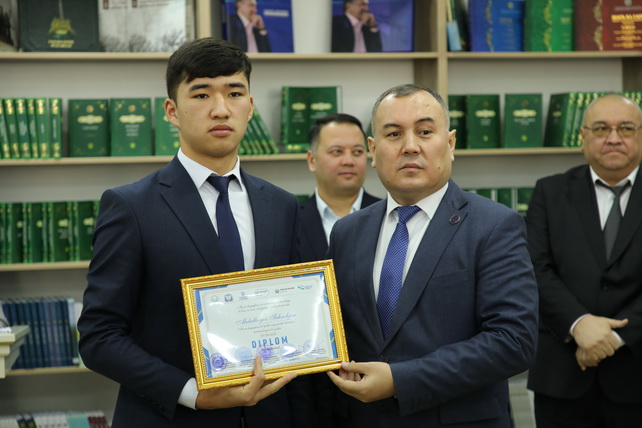
Results of the "Education and Innovations in the Field of Human Rights and Freedoms" Contest Announced
Results of the "Education and Innovations in the Field of Human Rights and Freedoms" Contest Announced
Tashkent, Uzbekistan (UzDaily.com) — On 13 December 2024, the National Center for Human Rights of the Republic of Uzbekistan held a ceremony to award the winners of the national contest "Education and Innovations in the Field of Human Rights and Freedoms." The event was hosted by Akmal Saidov, Director of the National Center for Human Rights.
The contest was organized at the initiative of the National Center for Human Rights in cooperation with the Ministry of Higher Education, Science and Innovation, the Ministry of Preschool and School Education, the Youth Affairs Agency, and the Youth Union of Uzbekistan. The contest was conducted in line with the requirements of the Presidential Decree of the Republic of Uzbekistan dated February 7, 2023, "On the Approval of the National Program for Education in the Field of Human Rights in the Republic of Uzbekistan."
The contest ran from June 1 to November 1 of this year. The main focus was on raising legal awareness and literacy among all segments of the population by promoting education and innovation in human rights and freedoms, as well as supporting scientific research.
The competition was held in six categories, with 819 participants. According to the regulations, if a specific category received three or fewer applications, the contest in that category would not take place. As a result, the determination of winners in the categories "Best Educational Literature on Human Rights: Printed and Electronic Textbooks" and "Best Educational Course on Human Rights" was not considered.
The submitted applications and creative works were carefully reviewed by the jury. As a result, winners were determined in four categories. Diplomas and prizes were awarded to the following winners:
I. Best Video on Human Rights and Freedoms:
1st place — Mukhlisha Muminova, 3rd-year student, Tashkent Institute of Irrigation and Agricultural Mechanization Engineers.
2nd place — Bekhruzbek Adiljanov, 10th-grade student, Presidential School of Nurafshan, Tashkent region.
3rd place — Charos Azizova, 4th-grade student, School No. 49, Samarkand.
Best Article on Human Rights: Best Research and Popular Article:
1st place — Sanjar Saidov, Associate Professor, Department of Political Science, Uzbek State University of World Languages.
2nd place — Khurmatkhon Makhmudova, student of the Faculty of Law, Bukhara State University.
3rd place — Sarvarbek Rasulov, 3rd-year student, Tashkent State University of Law.
3rd place — Feruza Primkulova, 3rd-year student, Correspondence Department, Tashkent State University of Law.
Author of the Best Innovative Idea on Human Rights:
1st place — Mehriniso Esanova, 2nd-year student, International Islamic Academy of Uzbekistan.
2nd place — Nurillo Tuktasinov, lecturer, Tashkent State University of Law.
3rd place — Munisakhon Ruzieva, preschool teacher at "Nur Ziye" kindergarten.
3rd place — Oybona Ibrokhimova, student at the M.S. Vosikov Academic Lyceum, Tashkent State University of Law.
Research in the Field of Human Rights:
1st place — Dilshodbek Yozilov, 1st-year student, Tashkent State University of Law.
2nd place — San’at Sadiqov, craftsman from Gijduvan district, Bukhara region.
3rd place — Sukhrobjon Abdullaev, 1st-year student, Tashkent State University of Law.
Special Recognition:
Certificates of appreciation were awarded to partner organizations that actively conducted training courses aimed at expanding youth opportunities through education in human rights.
This event was part of the "Ten Days of Human Rights," celebrated in honor of the 32nd anniversary of the Constitution of the Republic of Uzbekistan, the 76th anniversary of the Universal Declaration of Human Rights, and December 10th – International Human Rights Day.
The national contest held significant value for promoting education and innovation in the field of human rights, increasing legal culture in society, and supporting scientific research in this area. The achievements of the winners and active participants of the contest serve as a motivation for further efforts to develop human rights education.